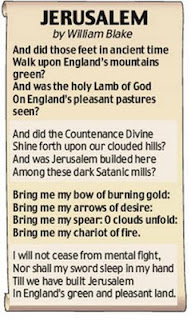
Students were introduced to Blake's poem JERUSALEM and introduced to a few snippets that relate to Jez Butterworth's play. Students discussed the significance of the painting of Newton by Blake and the sentiment of Blake's famous poem. Students were made aware that this poem is an aspirational poem that suggests that England can be a better country and that one day it might actually be worthy of being termed JERUSALEM. Jerusalem in this poem could be considered a symbol for a Utopia or a country fit for Jesus to visit.
The lesson moved on to consider the final chapter of THE GREAT GATSBY with particular focus placed upon the final lines of the novel. Various interpretations were discussed. This is a very ambiguous conclusion and students need to engage with this final section and develop their own interpretation of the final sentences. Students should refer to the photocopy provided as this will inform your reading.
Students were asked to consider the question:
'GATSBY IS A NOVEL TRAPPED IN TIME WITH LITTLE RELEVANCE FOR A TWENTY-FIRST CENTURY READER.' TO WHAT EXTENT DO YOU AGREE WITH THIS STATEMENT?
This is the kind of question that you will be expected to answer in the exam after the 'HOW DOES THE WRITER TELL THE STORY..' question. Class response was impressive. Well done.
After two hours of tales about English Bull Terriers on the Westwood, fruit wrapped in poetry, and a one man drama that attempted to illustrate the sentiment at the end of Gatsby through the dramatic attempt to purchase a Morrisons' steak pie....it was time to go home.
HOMEWORK: READ JERUSALEM. We will begin to read the play in the next session. Students need to consider the Gatsby question that we discussed briefly at the end of the session. Students should also consider the question:
HOW DO YOU RESPOND TO THE VIEW THAT IT IS VERY DIFFICULT FOR READERS TO FEEL ANYTHING OTHER THAN CONTEMPT FOR TOM BUCHANAN?
Furthermore, students should read TROTAM. I am going to explore the fifth section of the poem in the next lesson. I will also discuss the following questions:
COLERIDGE DESCRIBED HIS POEM AS A WORK OF 'PURE IMAGINATION.'
TO WHAT EXTENT DO YOU AGREE WITH THIS ASSESSMENT OF TROTAM?
and
'TROTAM IS SIMPLY A TALE OF CRIME AND PUNISHMENT.'
HOW DO YOU RESPOND TO THIS VIEW?
So...lots of reading and thinking required for homework folks. Also click on link below to view the complete version of Obama's inauguration speech. How do the ideas explored in this speech relate to Fitzgerald's THE GREAT GATSBY?
http://www.bbc.co.uk/news/world-us-canada-21117466














